Prairie Wife of the Week: Colleen Worman (Type 1 Diabetes)
Posted June 28, 2017 by Prairie Wife - 2 comments
This Prairie Wife is near and dear to my heart. I’ve known her longer than The Cowboy (page down to see a pic of us from back in the day) and she stood beside me when I became a Prairie Wife. I’ve been wanting to share her story for years, and I think after you read this interview you’ll know why it’s SO important for us to spread the word. There is currently NO CURE for Type 1 Diabetes and it’s up to us to find one.
Prairie Wife (PW): First tell us a little bit about you and your family.
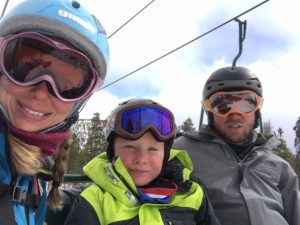 Colleen Worman (CW):I live with my husband Brett, and our son Van in Fort Collins, CO. Brett and I grew up together in Gillette, WY. I’ve known him since kindergarten! We have a 9-year-old son, Van who is named after Van Morrison. Van is full of energy and quick wit. As a family we love to fish, bike, climb, camp and play with our dog. I have a younger brother and sister with sweet young families whom I love dearly. My parents are amazing. They helped me understand the notion of working hard and playing hard. My family has always supported me and encouraged me to be strong. I’m fortunate to have an awesome family on Brett’s side too….amazing nieces and nephews, sisters and brothers, and another set of parents.
Colleen Worman (CW):I live with my husband Brett, and our son Van in Fort Collins, CO. Brett and I grew up together in Gillette, WY. I’ve known him since kindergarten! We have a 9-year-old son, Van who is named after Van Morrison. Van is full of energy and quick wit. As a family we love to fish, bike, climb, camp and play with our dog. I have a younger brother and sister with sweet young families whom I love dearly. My parents are amazing. They helped me understand the notion of working hard and playing hard. My family has always supported me and encouraged me to be strong. I’m fortunate to have an awesome family on Brett’s side too….amazing nieces and nephews, sisters and brothers, and another set of parents.
I work for the school district and support elementary school teachers in their work with children who are learning English. Working with young children makes me happy because their zest for life is contagious. Getting to see this world that we know so well as adults through their eyes, where so many things are new and exciting, is a great reminder of the beauty in our world.
I am intuitive and sensitive and have a few very close friends…Prairie Wife being one of them. I love to garden, read, and practice yoga. I believe in kindness, love and joy and try to focus my energy there as much as possible.
PW: Can you tell us when you first knew you had Type 1 Diabetes?
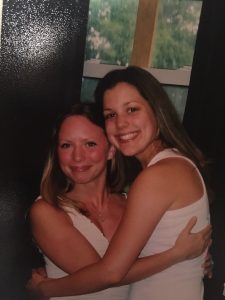 CW: I was 20 years old at the University of WY. I was extremely dehydrated and had been going to the bathroom so frequently that I knew something had to be wrong. I remember feeling parched and exhausted. I would get home from class and collapse into bed, barely able to do much more. I went home over Thanksgiving and had lost a lot of weight which my family was concerned about. They insisted I see a doctor at student health when I returned. When I was driving back to Laramie, I missed the turn-off because I couldn’t read the signs telling me to exit. My vision was very blurry. One night at work in the basement of the library, as I was walking to the bathroom for the second time in 30 minutes, I realized that I had all of the classic symptoms I had ever heard about diabetes. I went in the next day and had my blood sugar checked. I don’t remember the exact number but it was in the high 300s. Normal blood glucose is between 80-120. Thankfully I didn’t go into Diabetic ketoacidosis as many do when they first are diagnosed. I started insulin the next day and within a week, I began to regain clarity in my vision, sustain energy, and gain weight back.
CW: I was 20 years old at the University of WY. I was extremely dehydrated and had been going to the bathroom so frequently that I knew something had to be wrong. I remember feeling parched and exhausted. I would get home from class and collapse into bed, barely able to do much more. I went home over Thanksgiving and had lost a lot of weight which my family was concerned about. They insisted I see a doctor at student health when I returned. When I was driving back to Laramie, I missed the turn-off because I couldn’t read the signs telling me to exit. My vision was very blurry. One night at work in the basement of the library, as I was walking to the bathroom for the second time in 30 minutes, I realized that I had all of the classic symptoms I had ever heard about diabetes. I went in the next day and had my blood sugar checked. I don’t remember the exact number but it was in the high 300s. Normal blood glucose is between 80-120. Thankfully I didn’t go into Diabetic ketoacidosis as many do when they first are diagnosed. I started insulin the next day and within a week, I began to regain clarity in my vision, sustain energy, and gain weight back.
PW: Many of our readers may not know what Type 1 Diabetes (T1D) is, the causes, the treatment, the general effects on your health…can you educate us?
CW: Type I Diabetes is an autoimmune disease. Many people assume that diabetes is caused by eating too much sugar. This is not the case for Type 1. Basically, in Type 1, the immune system attacks the insulin-producing cells in the pancreas, leaving the body unable to deal with glucose. Only 5% of diabetics have Type 1. The remainder have Type 2 which is when the body’s ability to address glucose is hindered due to a variety of things such as obesity, diet, genetics. There is nothing you can do to prevent Type 1 and nothing to cure it at this point in time. Insulin is a treatment and not a cure. Many diabetics choose to use an insulin pump for insulin therapy. I tried a pump when I was first diagnosed but really struggled with it being attached to me constantly. It became an annoyance.
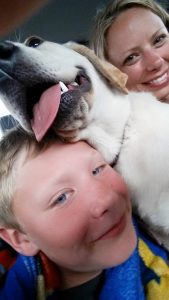 An insulin pump continuously injects short-acting insulin into your body to keep your blood glucose levels at as normal of a range as possible. When you eat anything that affects your BG, you bolus from your pump or inject insulin. I currently use Multiple Daily Injections (MDI) as insulin therapy. I take two shots of long acting insulin each day. This type of insulin acts as a basal that keeps BG from rising over a 12-24 hour time period. I take shots from an insulin pen of short acting insulin, Humalog, when I need to correct or cover something I have eaten that will raise my BG quickly, within 30 minutes or so. If I eat a higher amount of protein, I use a different type of insulin with a syringe that peaks at about 90 minutes, which is usually when I see a rise from protein. It’s quite the science.
An insulin pump continuously injects short-acting insulin into your body to keep your blood glucose levels at as normal of a range as possible. When you eat anything that affects your BG, you bolus from your pump or inject insulin. I currently use Multiple Daily Injections (MDI) as insulin therapy. I take two shots of long acting insulin each day. This type of insulin acts as a basal that keeps BG from rising over a 12-24 hour time period. I take shots from an insulin pen of short acting insulin, Humalog, when I need to correct or cover something I have eaten that will raise my BG quickly, within 30 minutes or so. If I eat a higher amount of protein, I use a different type of insulin with a syringe that peaks at about 90 minutes, which is usually when I see a rise from protein. It’s quite the science.
There are terrifying complications to uncontrolled diabetes. People can get ulcers in the small vessels in their eyes, causing diabetic retinopathy and loss of sight. Feet and limbs are affected in the same way; causing ulcers, sores, and if left untreated can become infected and a need for amputation. High BG also has lately been correlated to Alzheimer’s and dementia. These complications have driven me to gain strict control of my BG through a low carb, high-protein diet.
PW: Can you talk to us about the first few years of learning to live with T1D?
CW: As most people with a newly diagnosed chronic and dangerous illness, I trusted my physicians, nutritionists and diabetic educators. I followed the American Diabetes Association (ADA) recommendations for diet. I have come to learn that their recommendations do not work for me. We want to trust our doctors but we must also be smart, well-researched, careful and critical consumers. I was never able to gain control with the recommendations given by the ADA and dieticians. I suffered terrifying low blood sugars and dangerous high blood sugars. Within the past two years I have been learning more about low carb, high protein diets such as the keto diet. This way of eating has improved my life dramatically.
Dealing with insurance companies can be incredibly frustrating. I have not chosen this disease. Delays in being able to receive my life-sustaining medication due to paperwork errors or miscommunication is incredibly frustrating and only adds to the burden. Concerns about what may happen to those who are considered to have pre-existing conditions or cannot afford their medication weigh heavy on my mind. Insulin, like the epi-pen has increased in price ridiculously over the past few years.
I learned that I am not immune to bad or scary things happening to me. So many of us feel that certain things won’t happen to us, but they can and do. Thankfully I have an amazing support system in my friends and family. The first few years would have been harder if I didn’t have such amazing people surrounding me. The Cowboy even bought me sugar-free candy when he first found out…I remember that kindness still today. People will always help if you give them the chance to do so.
PW: What have you learned through the years that may be helpful to others that have recently been diagnosed with T1D?
· Dexcom’s Continuous Glucose Monitor (CGM) has had an amazing impact on my life. This system consists of a sensor that you insert under your skin, a transmitter that sends the information and a receiver that receives and displays the information. This system monitors your glucose levels constantly and records trends. I still need to prick my fingers to check my BG but not as often. This system reads my BG every 5 minutes and sends the number to the receiver. I am fortunate to have an iPhone and Apple Watch that collect this information through Bluetooth capabilities. I can read my BG on my watch constantly. I can see patterns throughout the day and make decisions around insulin and activity based on patterns that I see. It has taken away many fears for me and has allowed me to gain some freedom back.
· Find Dr. Bernstein and TypeOneGrit ASAP. Check out Maria Emmerich’s amazing cookbooks and website.
· Find a counselor or therapist to help you cope with the stressors of having a chronic disease.
· You will be fine. You can take control of this and while you will live with it every second of your day, it doesn’t need to determine your life by acting as a ceiling for you.
· Have hope. I was promised a cure in my lifetime and we get closer every day.
PW: Many people don’t know that having T1D can have a dramatic effect on a woman’s ability to become pregnant and carry a baby full term. As the mother of a now 9 year old boy what was your experience like?
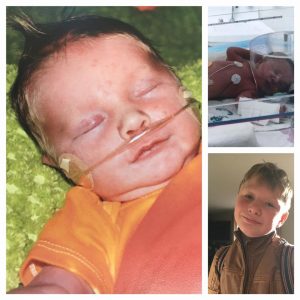 CW: I know of many women (through Facebook support groups) who have had successful pregnancies. The success is determined by the level of control that a woman has. I felt like I had good control when I was pregnant but have gained even better control. I had complications that were attributed to diabetes such as preeclampsia and a baby that was gaining weight quickly. I also have a blood clotting disorder that I was not aware of until my second trimester. I had a blood clot in my leg and remember calling Prairie Wife about it…she was my friend expert because she had already had one baby and had number two on the way. She said that yes, a swollen leg deserved a hospital visit.
CW: I know of many women (through Facebook support groups) who have had successful pregnancies. The success is determined by the level of control that a woman has. I felt like I had good control when I was pregnant but have gained even better control. I had complications that were attributed to diabetes such as preeclampsia and a baby that was gaining weight quickly. I also have a blood clotting disorder that I was not aware of until my second trimester. I had a blood clot in my leg and remember calling Prairie Wife about it…she was my friend expert because she had already had one baby and had number two on the way. She said that yes, a swollen leg deserved a hospital visit.
I was afraid to be put on bed-rest but ended up being able to take blood thinners for the rest of my pregnancy. The blood thinners and a need for an emergency c-section due to pre-eclampsia and baby’s dropping heart rate created a very scary and humbling situation. It was one of those moments where you wake up thankful to be alive. It wasn’t the typical c-section. Brett wasn’t allowed to be in with me and I was put completely under. I woke up and asked, “How is he?” I remember that they told me that our baby was with his dad and that they were doing well. I fell back to sleep for the rest of the day. I had lost so much blood. I still regret that I did not have that amazing first moment of skin-to-skin contact with him because I know how important that is. I also understand that he was well-taken care of and that we have an amazing bond even though we did not have that moment that is always celebrated in pictures and movies.
Brett was amazing. He was doing all of the right things for our baby. I’m so thankful to have him as a partner in this life. Van was ready to go home before I was because my wound was not draining properly. When we were both finally cleared to go home, I sat in the parking lot in a wheel chair with my mom, holding my baby, while my husband tried to figure out how the car-seat worked. We were not prepared to bring a baby home but with the support of our family, it all worked out. Van was born 5 weeks early and was sent home on oxygen. It was terrifying. I think every first-time mom questions whether or not they should be taking this brand new, fragile baby home without doctors and nurses and I feel we had more reason for worry. We had a nurse that visited our home daily to check on Van and his oxygen levels. He grew wonderfully. He is now a thriving and wildly active boy.
After his birth, my OBGYN recommended that we not have more children due to the complicated pregnancy and birth that I had with Van. I never imagined that I would only have one child and truly grieved that. After hearing from Brett that he was truly afraid to lose me, I understood his hesitancy about another baby as well. I would say that many woman, with the proper preparation, planning and precautions can become a mom. I would also say that any woman whose body is not capable of carrying a strong and healthy pregnancy should not hesitate to consider adoption.
I struggled to nurse. The vision that I had for Van’s birth did not happen. I wanted to try for a natural birth, I wanted to nurse. I could not do either. I felt like a failure as a mom because I had built these things up so much. I wondered how something so natural as nursing could be so difficult. Simply put, my body was too stressed to create milk for him. I was able to pump and supplement with the little milk that I was able to produce. I tried medication and natural supplements to help milk production but it quickly subsided. This broke my heart because I did not want to feed my baby formula. Now I understand that it is OK. That I did my best and that my son is thriving, regardless.
PW: Having T1D can be a lifelong struggle finding balance. What have you learned about yourself through this?
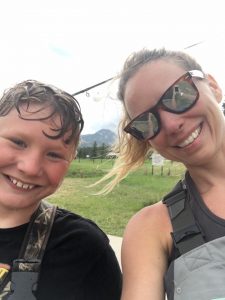 CW: Grace. Giving myself grace has been a struggle. Sometimes I am so frustrated. Things like stress can affect your sensitivity to insulin. Everyone has stressors and I need to be aware of them and ensure that I am able to cope with my stressors. I also am working to be aware of how my frustration affects those around me. Simply, my happiness should not be determined by my blood sugars and I have the ability to do all that I can but also need to give myself grace in those moments where it might not be easy.
CW: Grace. Giving myself grace has been a struggle. Sometimes I am so frustrated. Things like stress can affect your sensitivity to insulin. Everyone has stressors and I need to be aware of them and ensure that I am able to cope with my stressors. I also am working to be aware of how my frustration affects those around me. Simply, my happiness should not be determined by my blood sugars and I have the ability to do all that I can but also need to give myself grace in those moments where it might not be easy.
I have practiced yoga for a long time but only recently have I uncovered the strength and stability that it provides to me. I have also added meditation to my routine. Making this time for myself has not been easy but it is something that I truly believe in. It has helped me gain calming techniques, realize my strength and flexibility, and has given me hope and peace.
For me, focusing on my family and wanting to provide my son with amazing and loving experiences helps me get through challenges. I want him to remember a childhood filled with joy and adventures and I am key in making this happen.
PW: What are some positive things that have come from having T1D?
CW: I’m strong! I’ve found my voice and advocate for myself without hesitation. I eat an incredibly healthy diet and take care of my body and mind. I treasure every moment and focus on memory-making.
PW: Do you have any words of encouragement or tips for family members that have a loved one that has T1D?
 CW: Find a support system of those who can relate to the daily challenges and celebrations. I found my support system in a Facebook Group called TypeOneGrit, which is a group of dedicated Type 1 diabetics who follow Dr. Bernstein’s (a diabetic himself) recommendations and a low-carb diet. There are also many local support groups if you like to meet with people in person.
CW: Find a support system of those who can relate to the daily challenges and celebrations. I found my support system in a Facebook Group called TypeOneGrit, which is a group of dedicated Type 1 diabetics who follow Dr. Bernstein’s (a diabetic himself) recommendations and a low-carb diet. There are also many local support groups if you like to meet with people in person.
Look for Maria Emmerich’s amazing cookbooks so you too can have dessert and normal blood sugars during the holidays. My dad made me one of her amazing cheesecake recipes for Christmas and I was able to easily control my blood sugars and enjoy a delicious treat.
Be honest and open with those close to you about your health needs and how you are coping-how you might be feeling or affected on a day-to-day basis.
Diabetics can live a long and healthy life if they make it a priority and take it seriously. Everyone has bad days but the good days now outweigh the bad for me in a huge way. You can do the same. Find Dr. Bernstein’s book.
There is hope in science and research.
PW: Any last Prairie Wife words of wisdom?
Soak it up. Breathe slowly, often. Be present in this moment…wherever you are, whatever you are doing, and whomever you are with.
Leave a Comment
2 thoughts on "Prairie Wife of the Week: Colleen Worman (Type 1 Diabetes)"
Categories: Life As It Happens, Prairie Wife of the Week
Tags: , colleen worman, education, interview, Prairie Wife of the Week, resources, support, type 1 diabetes
Previous Post « Stitch Fix Unboxing: Fourth Try
Next Post Are You Willing to RISK Being Happy? »
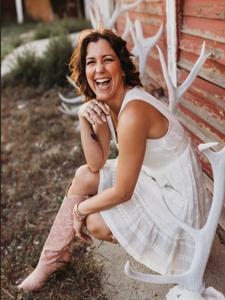
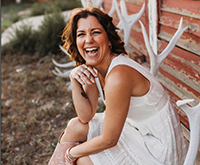


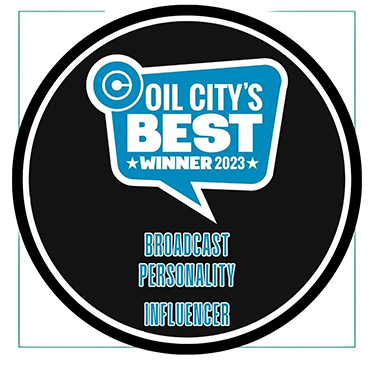
Such a great story. I was diagnosed at 70 with Type 1, what they call LADA. I’ll check out the resources!
Pat, I can always connect you to here too if you have questions!